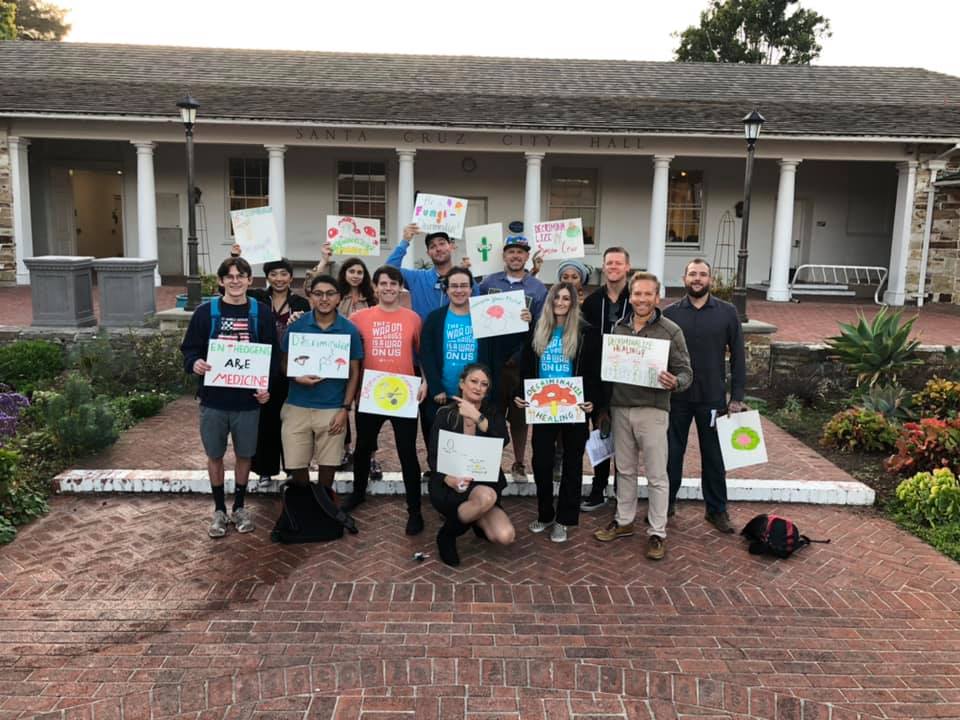On January 28, Santa Cruz, California became the third US city to decriminalize psychedelics. The Santa Cruz City Council unanimously passed a measure to decriminalize all psychedelic plants and fungi, including psilocybin mushrooms, ayahuasca, iboga and psychedelic cacti.
City and county police will now be instructed to make personal use, possession and cultivation of these substances their lowest priority for arrests. The city is also restricted from using funds to enforce criminal penalties for these substances.
Decriminalize Santa Cruz and Students for Sensible Drug Policy (SSDP) at the University of California at Santa Cruz, the activist groups behind the measure, have been working on developing this reform in their city since last summer and are planning celebrations to mark their victory.
“I am so overwhelmingly ecstatic,” Julian Hodge, Decriminalize Santa Cruz co-founder and President of the local SSDP chapter, told Filter. “Right after the vote I went outside to call my mom and started crying to her about the unanimous vote. This came from months of hard work, and I am so grateful that we got to make this happen.” Hodges explained that various members of the coalition were motivated to pursue this reform for mental health, wellness, or civil liberty reasons.
The Santa Cruz activists were encouraged by the successful passage of psychedelic decriminalization efforts last year in Denver, Colorado and Oakland, California. Their successful resolution is most closely modeled on the Oakland legislation, and they were in contact with the Oakland activists for support and advice. But the Santa Cruz effort differed from Oakland in some significant ways.
“We originally wanted to write this so it decriminalized all psychoactive plants and fungi, and sales,” Hodge said. The earlier draft resolution would have applied to possession of coca and poppy plants as well. “But we scaled it back so it looked more like the Oakland resolution. Now that this passed, we want to introduce more resolutions to expand on it and get us closer to where we want to be.”
Decriminalize Santa Cruz ultimately wants to achieve full drug decriminalization. While supporting the spiritual and medicinal implications of the Oakland-style reform, the group think that a narrow focus on entheogenic substances neglects the public health and economic benefits of decriminalizing all drugs.
Hodge explained that these policy differences created some distance between their organization and the Decriminalize Nature group in Oakland. “They were worried that this could stunt the national movement,” Hodge said. “We’re trying to keep ourselves separate and maintain our own power over this reform in our city, because we have different end goals in mind.”
Somewhat complicating the Santa Cruz decriminalization efforts is a local political scandal involving the City Council. On March 3, “Super Tuesday,” when 14 US states including California will be voting in the presidential primaries, Santa Cruz voters will also decide whether or not to recall and replace two Council members, Drew Glover and Chris Krohn.
Both are Democrats considered among the most progressive on the City Council, but are facing scrutiny over their handling of homelessness and other administrative matters. They also both supported this decriminalization resolution.
“Because that’s going on we didn’t want to add the extra trouble of adding more substances that might have prevented this from getting passed,” Hodge said. “Depending on what happens with the recall, we may maintain our momentum—or have more difficulty with more conservative Council members.”
Different members of the coalition have different ideas for which drug policy reforms they should seek next. Hodge wants to decriminalize selling cannabis without a license, as police have been cracking down harder on illicit dealers. Other Santa Cruz activists want to decriminalize drugs like LSD or MDMA. Time will tell what appetite the City Council has for any of this.
This Santa Cruz news comes in the year that California voters statewide may get to decide whether to decriminalize psilocybin mushrooms. Hodge believes the city- and state-level efforts should strengthen each other.
Image of Decriminalize Santa Cruz activists via Facebook.




